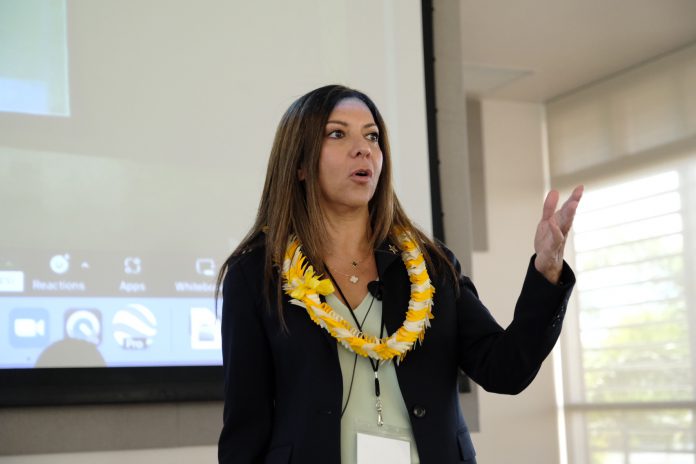With the start of the new academic year either in full swing or right around the corner for schools statewide, campus safety is top of mind for many.
This includes Dr. Lina Alathari, chief of the U.S. Secret Service National Threat Assessment Center (NTAC), which Alathari said stands ready to support its community partners in their effort to prevent incidents of targeted violence.
“Far too often, communities have been devastated by violence directed at places where we should all feel safe,” Alathari said. “NTAC’s research and training helps to empower communities with information on how to identify and intervene with those who pose a risk of violence to themselves or others. I am grateful to all of our audiences who are committed to this critical work.”
Alathari was among the presenters at the 2022 Hawai‘i Behavior Intervention/Threat Assessment Team (BITAT) Advanced Annual Training, presented by the University of Hawai‘i–West O‘ahu on Aug. 2 and 3 in collaboration with host campus Leeward Community College.
The event brought together about 100 participants, who attended in person or virtually from throughout the state and the mainland, with the shared goals of identifying, assessing, intervening, and managing threats in schools.
Attendees were a mix of public and private, K-12 and higher education officials, as well as local and federal threat prevention agencies. The guest speakers, all of whom attended in person, included the FBI, U.S. Department of Homeland Security, U.S. Secret Service, and more.
“This event represents the beginning of a small portion — focused on schools — of the state’s larger targeted violence and threat prevention strategy,” said event organizer Bev Baligad, Director of Compliance and Chair of the Behavior Intervention Team (BIT) at UH West O‘ahu. “I fully anticipate growing this event in the upcoming years.”
Dedication among all partners
UH West Oʻahu Chancellor Maenette Benham introduced attendees to Alathari before her three-hour presentation, “Averting Targeted School Violence: A U.S. Secret Service Analysis of Plots Against Schools.”
“In light of the good work that you are all doing collectively, who better to keynote this morning than Dr. Lina Alathari?” Benham said at the event. … “She is integral to and committed to support state efforts to build capacity of behavior intervention and threat assessment teams in the prevention of targeted violence in our schools — our schools that are the hubs of learning, teaching, discovery, exploration, and hope.”
In addition to Alathari, other speakers and training topics featured were the following:
- “Community Awareness Briefing,” by Michael Brown, Deputy Director at the Center for Prevention Programs and Partnerships (CP3), U.S. Department of Homeland Security
- “Targeted Violence & Terrorism Prevention (TVTP) Grants Briefing,” by Hector Tejeda, Program Analyst for Grants and Innovation at CP3, U.S. Department of Homeland Security
- “The State of Hawai‘i School BITATs: A Path Forward,” by Baligad
- “Reporting Potential School Violence Concerns: A Threat Team Hawai‘i Case Study,” by Special Agent Sara Fechtelkotter and Staff Operations Specialist Jillian Thumm with FBI Honolulu
- “Integrating Trauma Informed Care Strategies with the Use of Threat Assessments,” by Dr. Isaiah Moreno, Clinical Psychologist with Waikiki Health
- “Threat Team Hawaiʻi/Threat Team EDU and Hawai‘i Office of Homeland Security/Hawai‘i State Fusion Center,” Pati Kickland, Program Manager at Hawai‘i State Fusion Center
- “Suicide Prevention Foundations for Educational Settings,” by Dr. Jeanelle Sugimoto-Matsuda, faculty member at UH Mānoa Office of Public Health Studies
Madi Schoonover, Program Director of the TVTP Grant Program at UH West O‘ahu, noted that these collaborating partners were helpful in making the event possible and were the reason the event went as well as it did.
“All of the presenters who were willing to donate their time and energy for the sake of Hawai‘i was really special and showed how dedicated all federal and local partners are to building capacity here in our state,” Schoonover said.
Committed to making schools safer
The 2022 Hawai‘i Behavior Intervention/Threat Assessment Team (BITAT) Advanced Annual Training was for BITATs being implemented within the state, as well as other community partners. The teams — called “ECHO” teams — are being implemented by UH West Oʻahu’s Baligad and Schoonover with U.S. Department of Homeland Security TVTP Grant Program funds, which also paid for the annual training event.
The UH West O‘ahu BIT annual training has been a tradition since the team’s inception in 2017. Since then, UH West O‘ahu has held mandatory annual training in an effort to stay updated of any nation and state trends, continue team building, and review and modify its team manual if necessary.
In 2021, UH West O‘ahu extended invites to Leeward Community College and Windward Community College — other teams who had also received basic foundational training and who had teams positioned to understand trends that they could then consider for their campus.
“Then, after receiving the 2021 grant, we decided to begin opening up invitations to teams who we know have received foundational training, so that advanced topics, such as what we received during this last training, were more understandable as far as implementation and relationship to what the team does,” Baligad said.
This recent training included representatives from all identified ECHO teams: ECHO 1, Kapolei Middle School; ECHO 2, UH Maui College; ECHO 3, Windward Community College; ECHO 4 Island Pacific Academy; and ECHO 5 Kaua‘i Community College.
The UH West O‘ahu BIT, also referred to as “ECHO Alpha,” serves as the inspiration for successful implementation of BITATs across the state.
“We are not creating a model; we focus solely on building a strong team foundation so that whatever model is chosen by a school, it will be sustainable and strong,” Baligad emphasized.
She continued, “By helping schools implement strong, knowledgeable, and community-connected teams, we believe the state has the capability to make our schools and our ‘ohana safer.”
